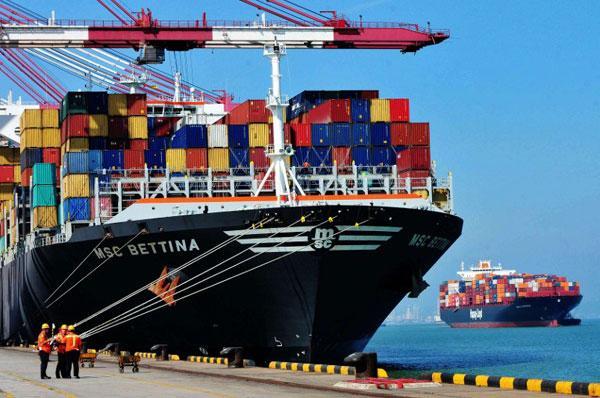
Financial Times reports that the immediate impact of any trade war between the US and China would be worse for Beijing, according to a new analysis of multinational companies' exposure to the Chinese market. Nor would the export sectors of the US and other major developed countries be significantly affected by an economic slowdown in China, says a report by The Conference Board drawing on export data. The New York-based corporate think tank found that US and EU value-added exports to China were equivalent to 0.7 per cent and 1.6 per cent respectively of national economic outputs. Even for neighbouring Japan, the figure was just 2.1 per cent. China's value-added exports to the US, by contrast, were equivalent to roughly 3 per cent of its gross domestic product, suggesting that Beijing has more to lose in any trade showdown with the Trump administration. "A trade war between the US and China, as seen through these data, doesn't appear to be a major threat to the US economy," said Erik Lundh, one of the report's authors who is a senior Conference Board economist. Mr Lundh, however, warned that the collateral damage from all-out trade war between the world's two largest economies would be considerable for both sides.
National Interests comments that in a move that is sure to upset China, a U.S. aircraft carrier will be visiting Vietnam in 2018, the first time an American carrier will be in the country since the end of the Vietnam War. Last week, Vietnam's Defense Minister Ngo Xuan Lich visited the United States to meet with Secretary of Defense James Mattis. The readout of the meeting said the two defense leaders "directed their staffs to work toward arranging a first carrier visit to Vietnam once technical conditions permit." The Pentagon later clarified that the goal was to arrange a visit some time next year. Although the sides didn't release any further details, the aircraft carrier is likely to dock in Cam Ranh Bay, the Vietnamese base that the U.S. Navy used extensively during the Vietnam War (and the Soviet Navy used afterward.) Last year, The Diplomat's Prashanth Parameswaran reported that the piers at Cam Ranh Bay had been refitted to accommodate aircraft carriers. The carrier visit is the latest sign that the two countries are rapidly strengthening ties in response to China's rise, despite the deeply ingrained suspicions from the war they fought in the 1960s and 1970s...The reality is that Duterte's pivot to China, combined with Thailand's flirtation with Beijing since the 2014 coup, also makes the United States more reliant on Vietnam in dealing with the South China Sea. Symbolic gestures like the aircraft carrier are a start, but nowhere near enough in dealing with Beijing.
- 2017-08-18 China Steps Up Warnings Over Debt-Fueled Overseas Acquisitions
- 2017-08-17 Steve Bannon, Unrepentant
- 2017-08-16 U.S. and China Ink Military Agreements; Mattis And His Troop Talk
- 2017-08-15 Trump administration goes after China over intellectual property, advanced technology
- 2017-08-14 We're Holding Pyongyang to Account
- 2017-08-13 China a sweet spot for US companies' earnings in second quarter
- 2017-08-11 China warns North Korea: You’re on your own if you go after the United States
- 2017-08-10 When the U.S. Last Faced an Emerging Nuclear Threat in East Asia
- 2017-08-09 Trump appears to grant China banks sanctions reprieve after UN deal
- 2017-08-08 China's international trade grows less than expected, surplus with US dips
- Financial Times Bannon exit provides only temporary relief to China
- New York Times China to Strengthen Oversight of 'Regulatory Arbitrage'-Central Banker
- Los Angeles Times China to limit overseas investments in real estate, sports
- Reuters China online retailer arrested on smuggling charges - China Daily
- Financial Times China Unicom to resume trading after confirming $11.7bn private placement plan
- Bloomberg China's Debt Swaps Surpass $100 Billion
- Financial Times Trump loses loudest but not the only economic nationalist voice
- Bloomberg With Some Countries, China is in the Red
- Financial Times Chinese state agency puts brake on Seat electric car
- Forbes This '301' Torpedo Is About To Sink The SS China
- www.huffingtonpost.com Seoul-Beijing Ties Drive Trade, Investment and Tourism Growth
- The Hill The media's biased reporting on China serves the rich and powerful
- Wall Street Journal Playing Chicken With China
